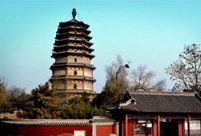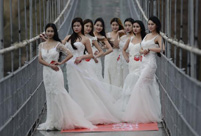

Two women inspect a Breguet wrist watch inlaid with 706 diamonds, and priced 1.77 million yuan ($276,563).CHINA DAILY
As Chinese spend on high fashion worldwide, local firms go shopping for brands to expand
Retailers, investors and industry insiders believe China's luxury goods industry, despite losses for the second year in a row in 2015, is still well on its way to a brighter future, coasting on the momentum of double-digit growth in recent years, said consulting firm Bain &Co.
The Fortune Character Institute's research findings appear to confirm the optimistic outlook. In 2015, Chinese consumers bought 46 percent of the luxury goods consumed worldwide. But 78 percent of it was bought outside China.
Chinese consumers of high fashion and luxury goods are becoming increasingly discerning too. Not for them any brand that is easily available or visible. By buying and encouraging the best among the existing luxury brands, Chinese consumers are emerging to be trendsetters.
To ride the rising wave of fashion consciousness among Chinese consumers, Shandong RuyiGroup, one of China's leading textile producers, reportedly joined the bidders for French fashion group SMCP on Jan 20, according to a Bloomberg report.
SMCP is estimated to be worth more than $1 billion. The group owns affordable luxury brands such as Maje and Sandro, which have been enjoying surging popularity among China's rising middle class in recent years.
Shandong RuyiGroup is ranked among the top four of China's 500 leading textile enterprises. Its consolidated annual revenue hit a record 30 billion yuan ($4.7 billion) in 2013.
The group declined to comment on its reported interest in acquiring SMCP.
Any such acquisition would be "just a drop in the bucket as the Chinese are fast climbing on to the upper chain of the luxury industry", said Zhou Ting, director of the Fortune Character Institute. "The (luxury) market remains one of the most lucrative for now and (shall remain so over) the next decade. This means, if Chinese companies and investors want a share, they should be more actively involved in every link of the supply chain, from designing and manufacturing to marketing and retailing."
Things have been moving in that direction of late.
For instance, China's homegrown online fashion retailer VipshopHoldings, known for its discounts, invested several millions of pounds in November for a minority stake in British fashion-maker BrandAlley, to introduce more British brands in China.
A month earlier, its competitor, Secoo.com, created quite a splash by opening the first cross-border experience store at Piazza Del Duomo, one of Milan's most-visited shopping areas.
Li Rixue, founder and CEO of Secoo.com, established the website seven years ago in Beijing. He called the Milan store "part of the company's ten-year globalization plan".
Industry insiders said that Secoo.com's aggressive expansion reflects a strategy to target high-spending Chinese tourists in Europe.
Zhou said what, where and how the Chinese buy will likely determine where Chinese, and probably global, investors' money would be pumped in.
 |
 Engineer troop builds bridge in real combat conditions
Engineer troop builds bridge in real combat conditions You can urinate in public in Chongqing
You can urinate in public in Chongqing Rice terrace scenery in southwest China's Yunnan
Rice terrace scenery in southwest China's Yunnan 2016 Miss Chinatown USA pageant held in San Francisco
2016 Miss Chinatown USA pageant held in San Francisco Ancient pagodas across China
Ancient pagodas across China Wedding dress show up in the air
Wedding dress show up in the air Candidates perform in 2nd examination at Beijing Film Academy
Candidates perform in 2nd examination at Beijing Film Academy Russian photographer brings fairytales to life
Russian photographer brings fairytales to life Chinese beauties, foreign models meet in Chengdu
Chinese beauties, foreign models meet in Chengdu Top 20 hottest women in the world in 2014
Top 20 hottest women in the world in 2014 Top 10 hardest languages to learn
Top 10 hardest languages to learn 10 Chinese female stars with most beautiful faces
10 Chinese female stars with most beautiful faces China’s Top 10 Unique Bridges, Highways and Roads
China’s Top 10 Unique Bridges, Highways and Roads Harsher sanctions on NK are inevitable
Harsher sanctions on NK are inevitable Under Pope Francis and President Xi, hopes rise for a thaw in ties
Under Pope Francis and President Xi, hopes rise for a thaw in ties Why top students from African nations are flocking to Chinese vocational schools
Why top students from African nations are flocking to Chinese vocational schools After recent discovery ‘predicted’ by amateur, demands spread online for scientist to apologize
After recent discovery ‘predicted’ by amateur, demands spread online for scientist to apologizeDay|Week